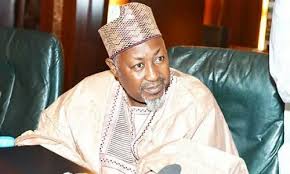Politics
Jonathan Should Be Held Responsible For Economic Recession “Not Buhari”- APC Governor Badaru of Jigawa

Governor Abubakar Badaru of Jigawa State has asked Nigerians to hold the immediate past administration of President Goodluck Jonathan responsible for the current economic recession in the country, saying despite being aware of what the future held, the then president carried on as if the economy was immune to such challenges.
The governor said for the country to get out of recession, competitiveness in line with global standard would bring about sustainability, saying aside that “there is no magic.”
Badaru spoke with journalists in Abuja, shortly after he was inaugurated to head the primary election panel of the All Progressives Congress, APC, for the Ondo State governorship election. He exonerated former President Olusegun Obasanjo of any blame regarding the current state of the economy.
He said: “On this recession, you have to look at the history. We had signals towards end of 2013 to 2014, it has been there. We knew that it was coming but the past leaders did nothing to stop it.
“The problem with the past leaders was that they should have started cutting these expenditures from time. For instance, what Obasanjo did with the cement was good. We stopped importation of cement into Nigeria. Why do we have to import rice, maize, why do we have to import wheat? Why do have to import milk? At the time the going was good, the government was supposed to give credible intervention for us like what Obasanjo did with the cement to handle the production of rice. It is no magic.
“Even though they knew the danger was coming, they built an economy based on what we got. It’s just like you are now earning N1million and spending it all in that year without thinking of your retirement, without thinking of you falling sick, without thinking that your wife will give birth to another child and that you’ll take the child to school.
“That is what these past leaders did, knowing fully well that the problem started since 2013 and they could have planned to keep us intact at this time.
“For instance, we all know that when time was good, we were earning like $3 billion monthly and our expenditure profile for importation rose to $2.5. So, at that time, we were able to stabilize the currency because the dollar we got we had enough to pay for what we needed.




